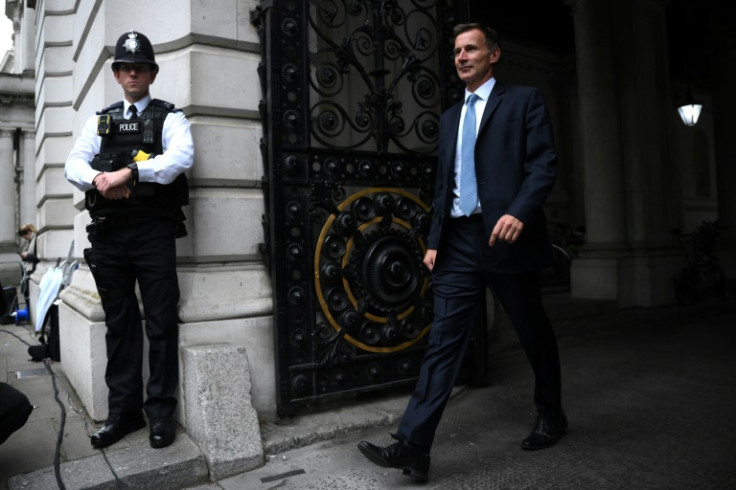UK Brings Forward Fiscal Measures After Budget Turmoil

Britain's new finance minister Jeremy Hunt will unveil tax and spending measures later Monday, bringing forward part of his fiscal plan to calm markets after a botched debt-fuelled budget.
Hunt, who was parachuted into the job on Friday to replace sacked Kwasi Kwarteng, will "make a statement bringing forward measures from the medium-term fiscal plan" that is due on October 31, the Treasury said in a statement.
Prime Minister Liz Truss fired Kwarteng on Friday after their recent tax-slashing budget sparked markets chaos, fuelling intense speculation over her political future just one month after taking office.
Monday's measures "will support fiscal sustainability", the Treasury added, after last month's notorious mini-budget had sent bond yields spiking and the pound collapsing on fears of rocketing debt.
"This follows... further conversations between the Prime Minister and the Chancellor over the weekend, to ensure sustainable public finances underpin economic growth," it added.
Chancellor of the Exchequer Hunt met with the governor of the Bank of England and the head of the Debt Management Office to discuss the plans late on Sunday.
Following his shock appointment, Hunt hit the ground running Saturday with a warning of looming tax hikes as he dramatically reversed course on right-wing Truss' radical programme of economic reform.
The mini budget, unveiled on September 23, went "too far, too fast", Hunt said over the weekend.
And the Chancellor warned that he was "not taking anything off the table" amid speculation over painful spending cutbacks, but also defended the prime minister.
Yet the furore over the budget -- which contained vast tax cuts and a costly freeze on domestic energy prices -- has reportedly sparked a plot to oust Truss from Downing Street.
In the wake of markets turmoil, the BoE was forced to jump into markets as a result under an emergency bond-buying policy which ended on Friday.
Tax cuts were the centrepiece of the ill-starred budget.
But they were financed through billions in extra borrowing, causing panic on financial markets at the prospect of higher inflation, which has already left British households in the grip of a cost-of-living crisis.
Truss dismissed Kwarteng hours after he had rushed home early from international finance meetings in Washington -- and she then staged another U-turn in acquiescing to a significant rise in profits tax levied on companies.
The premier had already abandoned a tax for the wealthiest earners, which had sparked outrage as millions of ordinary Britons suffer from decades-high inflation.
Senior Conservative members of parliament were reportedly plotting to unseat Truss, possibly within days, aghast at the party's collapse in opinion polls since she replaced Boris Johnson on September 6.
Monday's news sent the pound climbing 0.4 percent against the dollar while the UK's 30 year bond yield dipped slightly to 4.54 percent, as traders digested the news.
"New Chancellor Jeremy Hunt has the air of a troubleshooting teacher brought in to turn around a failing school and faces his first big presentation test today with an emergency budget plan wheeled out to try and calm financial markets," said Hargreaves Lansdown analyst Susannah Streeter.
But she warned: "Trussonomics may have been ripped up and fed to the shredder -- but the author of the big gamble remains in power, and has the final say on the direction of travel."
© Copyright AFP 2025. All rights reserved.




















